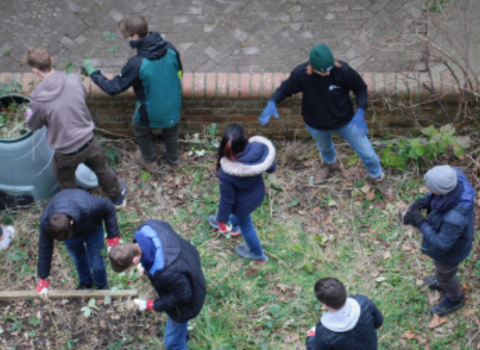Get to know our Young Volunteers!
While our Young Volunteers who joined us worked together in the garden of our headquarters in the centre of Bristol, I had the chance to interview some of them.
This experience just confirmed for me how knowledgeable and hardworking young people are. Each came to volunteering through a different route, but they all shared the same passion for nature and determination to make a difference.
Harry and Adam
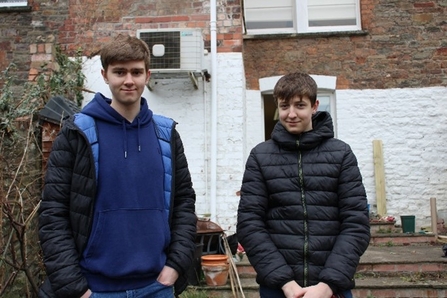
How did you start volunteering for Avon Wildlife Trust?
Adam: I applied to do work experience with Avon Wildlife Trust back when I was in Year 10. That was the year of covid, so I couldn’t do that. Instead, I noticed there was an ‘Our Bright Future’ program for young volunteers, so I applied to that and started going to those sessions every couple of weeks. These sessions were mostly at Grow Wilder, working on identification skills and getting young people into nature and helping out with the natural environment.
Harry: In Year 10, I did work experience at two garden centres. Adam had done it before, so I thought I’d do this as I thought it would be similar, along the same lines and I’d learn more.
What skills have you picked up since you’ve been here?
Harry: Identification skills and learning how to scythe so that more can grow back. You had to roll up the grass after scything with a pitch fork and put it into this brambly area so that the ground was clear so wildflowers could come up.
Adam: The main aim of scything is to cut down long grass instead of mowing it, because mowing it breaks it up so that the nutrients is absorbed into the soil and wildflowers can’t grow. If you scythe it, it allows wildflowers to grow instead. Obviously woodlands are good, but you want biodiversity, so it’s important to keep meadows. There was an expert there who taught us the basics of how to scythe and then they let us practice it. By the end, I think I did alright!
Where are you hoping to take your A-levels/studies?
Harry: I’m doing GCSEs and I take Resistant Materials, Food, Photography and History. The Food GCSE links into where food comes from and growing and things like that. In Resistant Materials we also learn about sustainable materials like wood. In Photography, the two projects I’ve done haven’t focused on nature but I have taken quite a few pictures of nature.
Adam: I’m doing Biology, Chemistry and Physics A-levels. I want to either go into Medicine, or because it’s quite competitive, maybe Biology. Part of the Biology course is looking at ecosystems and it also ties into plant and animal sciences.
What would you say to young people who are thinking of volunteering but are a bit nervous about joining in?
Adam: You don’t need to know a lot about identification or anything, because I was rubbish at it before. I think it’s definitely helped me. So don’t worry if you’re not any good at anything, because they teach you all the skills you need for the session.
Harry: It’s very inclusive and anyone can join. It also helps people with confidence.
What would be your message to people who are not sure how they can help out with the environment?
Adam: As you can see from what we’ve been doing today, you can do anything with very small amount of space. Look at Avon Wildlife Trust’s website and other conservation sites and see what they are doing. You can see what methods they are using and do that in any sort of garden that you have.
Molly and Xinyu
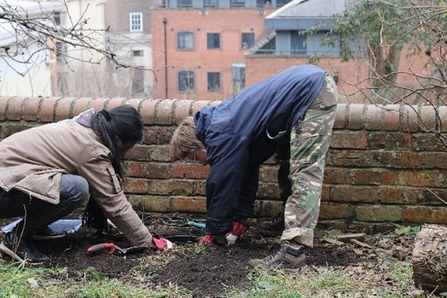
What are you working on today?
Molly: Today we are in the garden of the Avon Wildlife Trust offices trying to create a wild garden space to allow more biodiversity and nature to grow because currently it’s not that space.
Xinyu: I’m working with Molly to dig a hole in the ground and put a used bucket in there to make a pond. I think I had a go before at home making a pond by using a pot. I put some water in there and put in some rocks but it didn’t really attract any wildlife. With this one, we are going to put in some plants to maybe attract some small insects and animals all the way up the food chain.
How long have you been volunteering?
Xinyu: I started this group about October last year, but actually five years ago I volunteered at Grow Wilder and I was there for a few weeks. I live really close to Grow Wilder and just really like all the nature stuff. There’s lots of different activities that we can do like building bird boxes and IDing for wildlife and all sorts.
Molly: I also started around October. I did a course at Grow Wilder with Sophie [Keats, the Learning Officer - Young People lead at Avon Wildlife Trust] and it was really nice. It mainly was, at the time, a chance to step outside of what was currently going on in my life and try something new. It was really nice to be in a space where there was no pressure to get anything right. It was just being in a space and learning things and doing things and it’s really exciting! Mainly, I find that this really benefited my mental health, which is why I continue to volunteer. It's really satisfying and really rewarding. You learn a lot just by being in a space with loads of people who are also passionate about it.
Molly: This is the kind of environment where I feel the most calm. It would be really nice to be able to sustain myself by doing that. I am really excited by sustainability and rewilding and things like that, so I’d really like to continue with that. Right now it’s just really nice to have this separate space to just be in without any pressure to do anything right for anyone else but the environment.
Xinyu: It helps me just escape from daily life and enjoy nature and have something to do on weekends.
Kyal
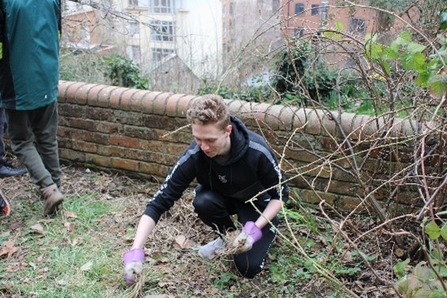
I want to go into conservation when I’m older as a career and I’m looking at studying environmental science at university next year. I wanted to do some volunteering to make a difference, even if it’s stuff like we doing today trying to make this garden a little bit better. Those little differences really add up over time to something bigger.
I found the volunteering because I was looking for volunteering stuff to do. I already knew about Avon Wildlife Trust, but I was looking on their website to see what sort of stuff they had and I came across the Young Volunteers group. I started going to this group at the end of last year and I really enjoy it- it’s a really friendly environment and it’s all about just getting involved and making a bit of a difference, which is what I want to do.
I’ve picked up communication skills with other people while I’ve been volunteering. Especially in terms of conservation, I think communication is key, not just with the people that you are working with but also with the outside world in terms of changing public opinions. I’ve also learned lots of practical skills like gardening, bird identification and plant identification. It’s not always the main focus of the session but there’s lots of little things that you pick up on that feeds into a general improvement in wildlife knowledge.
Tara
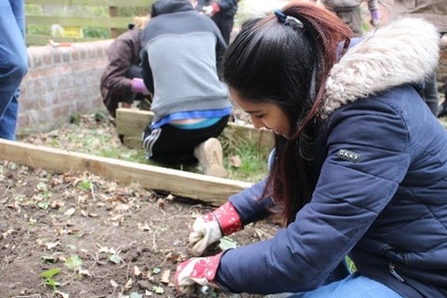
I’m originally from Singapore, I moved to the UK a couple of years ago to start university. I’m applying for a Masters in Global Wildlife Health and Conservation at the moment.
In Singapore, there is not a lot of room for nature, everything is very built up. All the parks we do have are quite man made and we’re not very good at letting things just grow. There was a different mindset here, which I found very interesting.
There was a guy on the corner of my street who was recruiting people to become Avon Wildlife Trust members and he sold it really well to me, so I became a member and found out about the volunteering program.
I’ve always wanted to become more involved with nature, but I’ve never lived anywhere where I’ve had my own garden or had access to much space. I wanted to become involved but I didn’t know how to start or what I was doing so this just seemed like a great opportunity and a way to do that.
I’ve learnt how to identify plants. When I came to my first session, I didn’t know what a bramble was so I had to have it pointed out to me. I’ve learnt about bringing up plants and not killing the roots. Simple stuff, but it’s been interesting and useful.
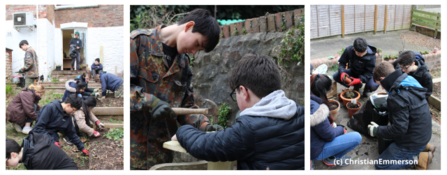
What advice would you give to other people thinking of joining, who might be worried that everyone else knows more than them?
Tara: I’d say that everyone is really supportive and it’s so much easier than you think it is. Once you dive into it, it just kind of flows and everyone around helps you. Especially here, there’s really no concept of ‘You don’t know what you’re doing, so you can’t be part of it’. Everyone is really willing to help and that’s what I love about it.
Kyal: It can be scary starting a new thing but we are all here for the same reason and you’ll find a lot of people like yourself. Not many of my friends share a similar interest to me so it’s nice to come here. In my first session, I was chatting to loads of people already and making friends just from talking about wildlife and similar interests. I’d definitely recommend doing it, it’s a great way to improve your skills and it’s a really good opportunity.
Molly: I would say the biggest step is just to turn up. It doesn’t matter if you don’t do anything and just sit and absorb all the information that everyone else is giving. You can give as much as you feel like you can. Just being there is enough for you to feel like you’ve done something instead of nothing.
Xinyu: I think they can maybe just try to have a go because you don’t really need any prior experience. This group is very open to everyone.
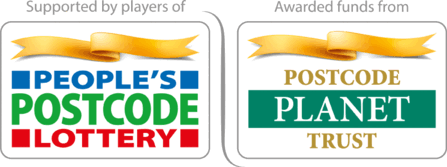
Thank you to #PotcodeLotteryPeople who make our work with young people possible.


